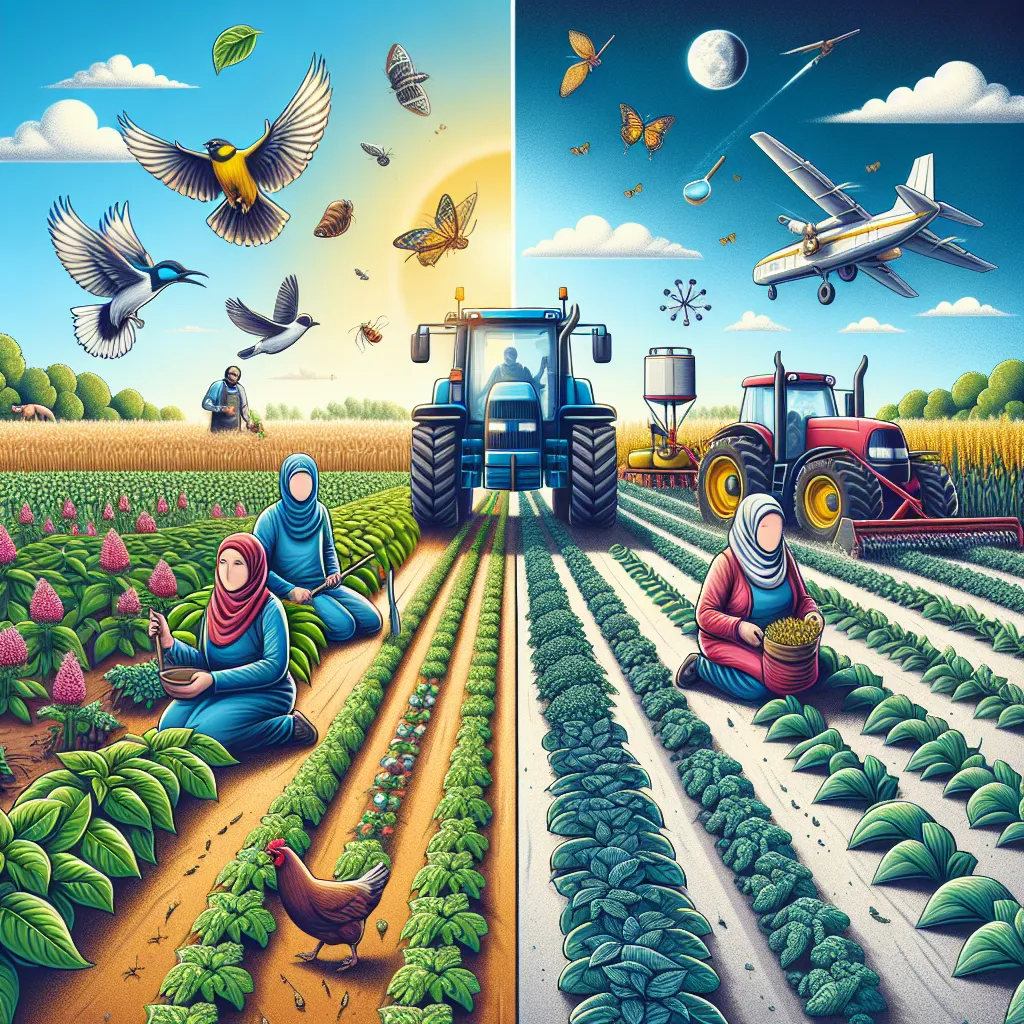The topic of organic farming versus conventional farming has been a recurring theme in IELTS Writing Task 2 essays. Based on recent trends and the growing global emphasis on sustainable agriculture, it’s highly likely that this subject will continue to appear in future IELTS exams. Let’s explore a sample question and provide model essays to help you prepare effectively for this topic.
 Organic vs Conventional Farming Comparison
Organic vs Conventional Farming Comparison
Analyzing the Question
Let’s consider the following IELTS Writing Task 2 question:
Some people believe that organic farming is better for the environment and human health than conventional farming methods. To what extent do you agree or disagree with this opinion?
This question requires you to evaluate the benefits of organic farming compared to conventional farming, focusing on environmental and health impacts. You need to express your opinion and support it with relevant examples and explanations.
Model Essay 1 (Band 8-9)
In recent years, the debate between organic and conventional farming methods has intensified, with proponents of organic farming arguing that it offers significant benefits for both the environment and human health. I strongly agree with this viewpoint and believe that organic farming practices are indeed superior to conventional methods in several crucial aspects.
Firstly, organic farming has a substantially lower environmental impact compared to conventional agriculture. By eschewing synthetic pesticides and fertilizers, organic farmers help preserve soil health and biodiversity. This approach promotes a balanced ecosystem where beneficial insects and microorganisms thrive, naturally controlling pests and enhancing soil fertility. In contrast, conventional farming’s heavy reliance on chemical inputs often leads to soil degradation, water pollution, and the destruction of beneficial organisms. For instance, a long-term study by the Rodale Institute found that organic farming methods can reduce carbon dioxide emissions by up to 40% compared to conventional practices, contributing significantly to mitigating climate change.
Moreover, organic farming practices yield produce that is generally healthier for human consumption. Organic fruits and vegetables are grown without synthetic pesticides, reducing the risk of harmful chemical residues in our food. A comprehensive review published in the British Journal of Nutrition in 2014 found that organic crops contain higher levels of antioxidants and lower levels of toxic heavy metals compared to conventionally grown produce. This suggests that a diet rich in organic foods may provide additional health benefits and reduce exposure to potentially harmful substances.
However, it is important to acknowledge that conventional farming currently plays a crucial role in meeting global food demands due to its higher yields. Nevertheless, as organic farming techniques continue to improve and become more efficient, the gap in productivity is narrowing. Furthermore, the long-term sustainability of organic methods may ultimately prove more beneficial for food security, especially in the face of climate change and soil degradation.
In conclusion, while conventional farming currently dominates food production, the environmental and health benefits of organic farming make it a superior choice for the future of agriculture. As consumers become more aware of these advantages and demand for organic products grows, it is likely that we will see a gradual shift towards more sustainable and health-conscious farming practices.
(Word count: 345)
Model Essay 2 (Band 6-7)
The debate about whether organic farming is better than conventional farming for the environment and human health is an important topic. I agree that organic farming has some advantages, but I also think conventional farming has its benefits.
Organic farming is good for the environment in many ways. It doesn’t use chemical pesticides or fertilizers, which can harm the soil and wildlife. For example, organic farmers use natural methods to control pests, like introducing helpful insects. This helps keep the ecosystem balanced. Also, organic farming often uses less energy and produces less pollution than conventional farming.
When it comes to human health, organic food might be healthier. Organic fruits and vegetables don’t have chemical pesticide residues, which some people worry could be harmful if eaten over a long time. Some studies have shown that organic food has more vitamins and minerals than conventionally grown food. This could mean that eating organic food is better for our health.
However, conventional farming also has some advantages. It can produce more food on the same amount of land, which is important for feeding the world’s growing population. Conventional farming methods have also become more efficient over time, using less water and energy than in the past.
In conclusion, while organic farming seems to be better for the environment and possibly for human health, conventional farming is still important for producing enough food. Maybe in the future, we can find ways to combine the best parts of both methods to create a more sustainable and healthy farming system.
(Word count: 252)
Key Writing Tips
-
Structure: Both essays follow a clear structure with an introduction, body paragraphs, and a conclusion. The Band 8-9 essay has more developed ideas and smoother transitions between paragraphs.
-
Vocabulary: The Band 8-9 essay uses more sophisticated vocabulary (e.g., “eschewing,” “biodiversity,” “mitigating”) compared to the Band 6-7 essay. However, both essays use topic-specific terms accurately.
-
Grammar: The Band 8-9 essay demonstrates a wider range of complex sentence structures, while the Band 6-7 essay uses simpler constructions but still maintains accuracy.
-
Coherence and Cohesion: The Band 8-9 essay has better overall coherence, with ideas flowing logically from one to the next. The Band 6-7 essay is also coherent but with less sophisticated linking.
-
Task Response: Both essays address the question directly, but the Band 8-9 essay provides more detailed examples and a more nuanced conclusion.
Important Vocabulary
- Organic farming (noun) /ɔːˈɡænɪk ˈfɑːmɪŋ/ – farming without synthetic chemicals or genetically modified organisms
- Conventional farming (noun) /kənˈvenʃənl ˈfɑːmɪŋ/ – farming using synthetic chemicals and modern methods
- Pesticide (noun) /ˈpestɪsaɪd/ – substance used to kill harmful insects or animals
- Biodiversity (noun) /ˌbaɪəʊdaɪˈvɜːsəti/ – variety of plant and animal life in a particular habitat
- Sustainable (adjective) /səˈsteɪnəbl/ – able to be maintained at a certain level without depleting natural resources
- Ecosystem (noun) /ˈiːkəʊˌsɪstəm/ – a biological community of interacting organisms and their physical environment
- Yield (noun) /jiːld/ – the amount of a crop produced per unit of land
- Soil degradation (noun) /sɔɪl ˌdeɡrəˈdeɪʃn/ – decline in soil quality due to improper use or poor management
- Food security (noun) /fuːd sɪˈkjʊərəti/ – the state of having reliable access to sufficient, affordable, nutritious food
- Antioxidants (noun) /ˌæntɪˈɒksɪdənts/ – substances that can prevent or slow damage to cells caused by free radicals
Conclusion
The topic of organic versus conventional farming is likely to remain relevant in IELTS Writing Task 2 essays. To prepare effectively, practice writing essays on related topics such as:
- The role of technology in sustainable agriculture
- Government policies to promote organic farming
- The economic impact of shifting to organic farming practices
- Balancing food production and environmental conservation
Remember to use a range of vocabulary related to agriculture, environment, and health, and support your arguments with specific examples and data when possible. Feel free to practice writing an essay on this topic and share it in the comments section for feedback and discussion. This active practice is an excellent way to improve your IELTS writing skills and prepare for the exam.


